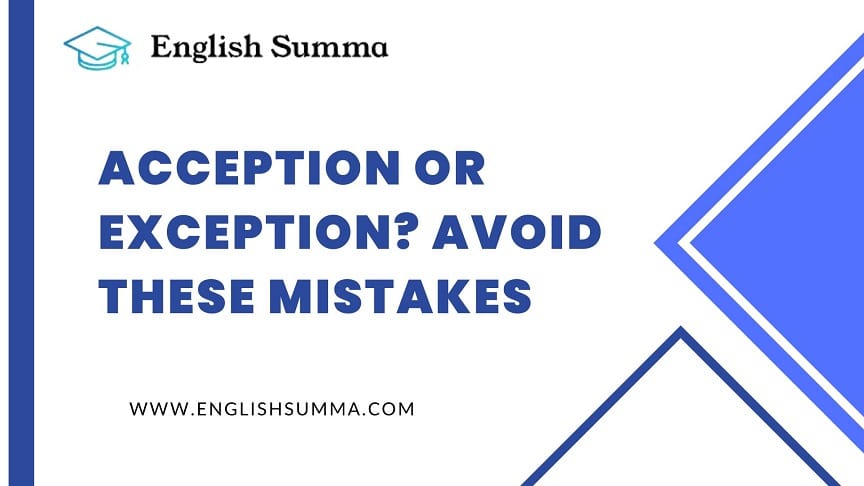Determining the correct spelling out of the the two similarly spelled words “acception” or “exception” can be confusing. Correct Spelling of words in the English language often comes down to understanding the context and meaning in which a word is being used. This article will examine the definitions, usages, and rules around these easily mixed up terms to clarify the proper spelling and application of each.
General Rule: “Exception” Is Widely Preferred
As a general rule, “exception” is the preferred spelling in most contexts. The word “acception” is considered an outdated, archaic version that is not commonly used in modern usage of English. Exception is acknowledged as the standard spelling in both American English and British English.
There are rare situations where “acception” may still be utilized, which we will explore, but it is crucial to understand that “exception” is the broadly accepted correct spelling and should be used in nearly all cases.
Learn the correct form of Is There Any Vs Are There Any
“Acception” – An Archaic Term
The word “acception” has largely fallen out of favor in the English lexicon, considered an acception – an archaic, obsolete, or literary term. At one time, “acception” enjoyed wider usage referring to the action of receiving something or the state of being acceptable. However, this meaning has been largely supplanted by words like “acceptance” or “reception.”
Some very formal writing may still contain “acception” to impart an aged tone, but it should be avoided in most modern usage scenarios. While it was once an acknowledged English word, “acception” can generally be considered an outdated relic.
Common Usages of “Exception”
Unlike “acception,” the term “exception” enjoys very widespread, regular usage in English. Its definitions relate to something that is excluded from a general rule, does not follow a pattern, or is unusual. Some examples include:
- An exception to a rule: “There is an exception to every rule.”
- Taking exception: “She took exception at being left out.”
- An unusual case: “His height was an exception among that group.”
- An exemption: “She was granted an exception from the policy.”
In all such cases when referring to something straying from the norm, “exception” is the correct spelling.
Is it What Kind of or What Kinds of? Learn more in this post.
Context Where “Acception” Still Appears
While quite rare, there are some very specific linguistic contexts in which “acception” may still appear. These include:
- Some technical writing related to philosophy or logic, referring to a particular meaning or interpretation of a term.
- Very formal style guidelines that adhere strictly to etymology may use “acception” to refer to the reception or acceptance of a word into language.
- Some academic writing analyzing word origins and meanings.
However, most standard writing would still use “exception” even when discussing the adoption of terms. Correct usage aligns with the widely preferred modern spelling of “exception” in nearly all situations. If you know someone correctly using the word ‘acception’, try searching their full name (e.g. Loriene Henline) on a people search tool to see their background – they may be a writer or philosopher!
Learn which form is correct, Of Course or Ofcourse
Differentiating Homophones
Part of the confusion surrounding “acception” and “exception” stems from the fact that they are homophones – words that sound the same but have different spellings and meanings. Homophones are particularly common in English.
Without seeing a word in written context, it can be easy to mix up homophones in speech. Many examples exist such as:
- Bear (animal) and Bear (carry)
- Piece (section) and Peace (absence of conflict)
- Brake (stop) and Break (smash)
In spoken English, rarely would these be confused, due to differing contexts. But homophones illustrate why examining word usage in sentences is key for choosing proper spelling. Based on the surrounding words, “exception” is correct in most circumstances where the homophone is heard.
American vs. British Spelling
Both major dialects of English – American English and British English – utilize “exception” as the standard, preferred spelling. The archaic form “acception” has largely fallen out of use in both written forms of English.
While some spelling differences exist between American and British variants – such as “theater” (American) and “theatre” (British) – no such distinction occurs for “exception.” Sources indicate that English language scholars and professionals in both the USA and UK almost unanimously accept “exception” as the only mainstream spelling.
Summary: Key Rules
In review, the key guidelines around these two terms are:
- “Exception” is the vastly preferred, correct spelling in most uses of English language.
- “Acception” is now seen as an outdated, archaic version used rarely outside of some technical contexts.
- As homophones, the two words sound identical so context offers necessary clues.
- Both American and British English utilize “exception” as the standard spelling.
In nearly all written works, from formal communications to creative fiction, “exception” is the proper choice. Checking context and usage is helpful when hearing homophones spoken aloud. But ultimately, mastering the ubiquitous modern spelling of “exception” over the antiquated “acception” is advisable in mastering English grammar rules.

